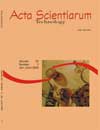<b>Modeling of the poultry carcass immersion chilling system using artificial neural networks</b> - DOI: 10.4025/actascitechnol.v31i2.3358
Keywords:
cooling, chillers, neural networks, chicken
Abstract
The process of cooling chicken carcasses by immersing them in mixture of cold water and ice (chillers) is complex. It is very difficult to represent it by a transport phenomenon model. In this work, artificial neural networks were used with an intermediary layer in the description and modeling of the cooling process of chickens. Different architectures of the neural network were tested, altering the numbers of input and hidden units. Data supplied by the Sadia-Toledo Company were used for training and validation of the neural networks. The input variables selected for the model were the following: carcass weight, initial temperature, propylene glycol temperature with external circulation, water flow rate of water in each tank, renewal water cooling time and temperature, and as output variable the temperature of the chicken when exiting the chiller. The results obtained showed that the network with 8 neurons in the input layer and 24 in the hidden layer best represented the investigated system.Downloads
Download data is not yet available.
Published
2009-06-17
How to Cite
Klassen, T., Martins, T. D., Cardozo Filho, L., & Silva, E. A. da. (2009). <b>Modeling of the poultry carcass immersion chilling system using artificial neural networks</b> - DOI: 10.4025/actascitechnol.v31i2.3358. Acta Scientiarum. Technology, 31(2), 201-205. https://doi.org/10.4025/actascitechnol.v31i2.3358
Issue
Section
Chemical Engineering
DECLARATION OF ORIGINALITY AND COPYRIGHTS
I Declare that current article is original and has not been submitted for publication, in part or in whole, to any other national or international journal.
The copyrights belong exclusively to the authors. Published content is licensed under Creative Commons Attribution 3.0 (CC BY 3.0) guidelines, which allows sharing (copy and distribution of the material in any medium or format) and adaptation (remix, transform, and build upon the material) for any purpose, even commercially, under the terms of attribution.
Read this link for further information on how to use CC BY 3.0 properly.
0.8
2019CiteScore
36th percentile
Powered by 



0.8
2019CiteScore
36th percentile
Powered by 



















